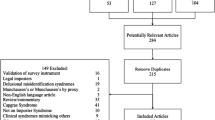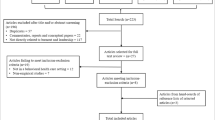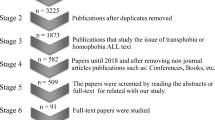Abstract
As of 2022, board certified behavior analysts who are certified for less than 1 year and have met the qualifications to serve in a supervisory capacity are required to meet with a consulting supervisor if they wish to supervise trainees’ fieldwork experience. These guidelines establish a different supervisory level of accountability in our field, supervision for supervisors. Recommendations that are uniquely tailored for new supervisors and address the relationship between new and consulting supervisors have not yet been published. In this article, we share recommendations and resources with new supervisors. We extend current literature by outlining steps new supervisors can take and resources they can use to prepare for a successful supervision journey with their consulting supervisor and supervisees.

Similar content being viewed by others
References
Allen, D. (2003). Getting things done: The art of stress-free productivity. Penguin.
Alvero, A. M., Bucklin, B. R., & Austin, J. (2001). An objective review of the effectiveness and essential characteristics of performance feedback in organizational settings (1985–1998). Journal of Organizational Behavior Management, 21(1), 3–29. https://doi.org/10.1300/J075v21n01_02
Andzik, N. R., & Kranak, M. P. (2021). The softer side of supervision: Recommendations when teaching and evaluation behavior-analytic professionalism. Behavior Analysis: Research & Practice, 21(1), 65–74.
Bailey, J., & Burch, M. (2016). Ethics for behavior analysts. Routledge.
Behavior Analyst Certification Board. (2017). BCBA/BCaBA task list (5th ed.). Littleton, CO.
Behavior Analyst Certification Board. (2018). Supervision training curriculum outline (2.0). Littleton, CO.
Behavior Analyst Certification Board. (2019). Newsletters. https://www.bacb.com/wp-content/uploads/2020/05/BACB_November2019_Newsletter-200826.pdf. Retrieved 1 Feb 2022.
Behavior Analyst Certification Board. (2020). Ethics code for behavior analysts. https://bacb.com/wp-content/ethics-code-for-behavior-analysts/. Retrieved 1 Feb 2022.
Behavior Analyst Certification Board. (2021). Consulting supervisors requirements for new BCBAs supervising fieldwork. https://www.bacb.com/wp-content/uploads/2020/11/Consultation-Supervisor-Requirements-and-Documentation_211130.pdf. Retrieved 1 Feb 2022.
Behavior Analyst Certification Board. (2022a). U.S. employment demand for behavior analysts: 2010–2021. Littleton, CO.
Behavior Analyst Certification Board. (2022b). BCBA handbook. https://www.bacb.com/wp-content/uploads/2020/11/BCBAHandbook_210513.pdf. Retrieved 14 Mar 2022.
Behavior Analyst Certification Board. (n.d.). ACE provider handbook. https://www.bacb.com/wp-content/uploads/2020/05/ACE-Provider-Handbook_211221.pdf
Britton, L. N., Crye, A. A., & Haymes, L. K. (2021). Cultivating the ethical repertoires of behavior analysts: Prevention of common violations. Behavior Analysis in Practice, 14(2), 534–548. https://doi.org/10.1007/s40617-020-00540-w
Brodhead, M. T., Quigley, S. P., & Wilczynski, S. M. (2018). A call for discussion about scope of competence in behavior analysis. Behavior Analysis in Practice, 11(4), 424–435. https://doi.org/10.1007/s40617-018-00303-8
Burton, M., & Kagan, C. (1994). The verbal community and the societal construction of consciousness. Behavior and Social Issues, 4(1), 87–96.
Chiesa, M., & Robertson, A. (2000). Precision teaching and fluency training: Making math easier for pupils and teachers. Educational Psychology in Practice, 16(3), 297–310.
Choi, E., Johnson, D. A., Moon, K., & Oah, S. (2018). Effects of positive and negative feedback sequence on work performance and emotional responses. Journal of Organizational Behavior Management, 38(2–3), 97–115.
Contreras, B. P., Hoffmann, A. N., & Slocum, T. A. (2021). Ethical behavior analysis: Evidence-based practice as a framework for ethical decision making. Behavior Analysis in Practice, 15(2), 619–634. https://doi.org/10.1007/s40617-021-00658-5
Cooper, J. O., Heron, T. E., & Heward, W. L. (2020). Applied behavior analysis (3rd ed.). Hoboken, NJ: Pearson Education.
Ditzian, K., Wilder, D. A., King, A., & Tanz, J. (2018). An evaluation of the performance diagnostic checklist-human services to assess an employee performance problem in a center-based autism facility. Journal of Applied Behavior Analysis, 48(1), 199–203.
Dixon, D. R., Linstead, E., Granpeescheh, D., Novack, M. N., French, R., Stevens, E., & Powell, A. (2016). An evaluation of the impact of supervision intensity, supervisor qualifications, and caseload on outcomes in the treatment of autism spectrum disorder. Behavior Analysis in Practice, 9, 339–348. https://doi.org/10.1007/s40617-016-0132-1
Ehrlich, R. J., Nosik, M. R., Carr, J. E., & Wine, B. (2020). Teaching employees how to receive feedback: A preliminary investigation. Journal of Organizational Behavior Management, 40(1–2), 19–29.
Garza, K. L., McGee, H. M., Schenk, Y. A., & Wiskirchen, R. R. (2018). Some tools for carrying out a proposed process for supervising experience hours for aspiring Board Certified Behavior Analysts. Behavior Analysis in Practice, 11(1), 62–70. https://doi.org/10.1007/s40617-017-0186-8
Getz, H. G., & Agnew, D. (1999). A supervision model for public agency clinicians. The Clinical Supervisor, 18(2), 51–62.
Gravina, N., Villacorta, J., Albert, K., Clark, R., Curry, S., & Wilder, D. (2018). A literature review of organizational behavior management interventions in human service settings from 1990 to 2016. Journal of Organizational Behavior Management, 38(2–3), 191–224. https://doi.org/10.1080/01608061.2018.1454872
Hajiaghamohseni, Z., Drasgow, E., & Wolfe, K. (2021). Supervision behaviors of board certified behavior analysts with trainees. Behavior Analysis in Practice, 14, 97–109. https://doi.org/10.1007/s40617-020-00492-1
Hamlin, E. R., & Timberlake, E. M. (1982). Peer group supervision for supervisors. Social Casework, 63(2), 82–87.
Hartley, B. K., Courtney, W. T., Rosswurm, M., & LaMarca, V. L. (2016). The apprentice: An innovative approach to meet the Behavior Analyst Certification Board’s supervision standards. Behavior Analysis in Practice, 9(4), 329–338. https://doi.org/10.1007/s40617-016-0136-x
Haynes, N. (2015). Time management: Get an extra day a week ((4th ed.) ed.). Logical Operations.
Helvey, I., Thuman, E., & Cariveau, T. (2021). Recommended practices for individual supervision: Considerations for the behavior-analytic trainee. Behavior Analysis in Practice, 15(1), 370–381. https://doi.org/10.1007/s40617-021-00557-9
Johnson, K. J., & Street, E. M. (2013). Response to intervention and precision teaching: Creating synergy in the classroom. .
Komaki, J. L. (1986). Toward effective supervision: An operant analysis and comparison of managers at work. Journal of Applied Psychology, 71(2), 270–279. https://doi.org/10.1037/0021-9010.71.2.270
LeBlanc, L. A., & Luiselli, J. K. (2016). Refining supervisory practices in the field of behavior analysis: Introduction to the special section on supervision. Behavior Analysis in Practice, 9(4), 271–273.
LeBlanc, L. A., Sellers, T. P., & Alai, S. (2020a). Building and sustaining meaningful and effective relationships as supervisor and mentor. Sloan.
LeBlanc, L. A., Taylor, B. A., & Marchese, N. V. (2020b). The training experiences of behavior analysts: Compassionate care and therapeutic relationships with caregivers. Behavior Analysis in Practice, 13, 387–393. https://doi.org/10.1007/s40617-019-00368-z
Mager, R. F. (1997). Making instruction work ((2nd ed.) ed.). CEP Press.
Meyer, V., & Turkat, I. D. (1979). Behavioral analysis of clinical cases. Journal of Behavioral Assessment, 1(4), 259–270.
Mourad, M., Kohlwes, J., Maselli, J., & Auerbach, A. D. (2010). Supervising the supervisors—Procedural training and supervision in internal medicine residency. Journal of General Internal Medicine, 25(4), 351–356.
Newman, B. (2007). Behavioral detectives: A staff training exercise book in applied behavior analysis. Dove & Orca.
Ninci, J., Čolić, M., Hogan, A., Taylor, G., Bristol, R., & Burris, J. (2021). Maintaining effective supervision systems for trainees pursuing a Behavior Analyst Certification Board Certification during the COVID-19 Pandemic. Behavior Analysis in Practice, 14(4), 1047–1057.
Parsons, M. B., Rollyson, J. H., & Reid, D. H. (2012). Evidence-based staff training: A guide for practitioners. Behavior Analysis in Practice, 5, 2–11.
Reid, D. H., Parsons, M. B., & Green, C. W. (2012). The supervisor’s guidebook: evidence-based strategies for promoting work quality and enjoyment among human service staff. Habilitative Management Consultants.
Schaefer, J. M., & Andzik, N. R. (2021). Evaluating behavioral skills training as an evidence-based practice when training parents to intervene with their children. Behavior Modification, 45(6), 887–910.
Sellers, T. P., Alai-Rosales, S., & MacDonald, P. F. (2016a). Taking full responsibility: The ethics of supervision in behavior analytic practice. Behavior Analysis in Practice, 9, 299–308.
Sellers, T. P., Valentino, A. L., & LeBlanc, L. A. (2016b). Recommended practices for individual supervision of aspiring behavior analysts. Behavior Analysis in Practice, 9(4), 274–286. https://doi.org/10.1007/s40617-016-0110-7
Sellers, T. P., Valentino, A. L., Landon, T. J., & Aiello, S. (2019). Board certified behavior analysts’ supervisory practices of trainees: Survey results and recommendations. Behavior Analysis in Practice, 12(3), 536–546.
Sush, D., & Najdowski, A. (2019). A workbook of ethical case scenarios in applied behavior analysis. Academic Press.
Tulgan, B. (2016). Bridging the soft-skills gap. Employment Relations Today, 42(4), 25–33.
Turner, L. B., Fischer, A. J., & Luiselli, J. K. (2016). Towards a competency-based, ethical, and socially valid approach to the supervision of applied behavior analytic trainees. Behavior Analysis in Practice, 9(4), 287–298. https://doi.org/10.1007/s40617-016-0121-4
Valentino, A. L., LeBlanc, L. A., & Sellers, T. P. (2016). The benefits of group supervision and recommended structure for implementation. Behavior Analysis in Practice, 9(4), 320–328.
Van Someren, M. W., Barnard, Y. F., & Sandberg, J. A. (1994). The think aloud method: A practical approach to modelling cognitive. Academic Press.
Walker, S., & Sellers, T. (2021). Teaching appropriate feedback reception skills using computer-based instruction: A systematic replication. Journal of Organizational Behavior Management, 41(3), 236–254.
Watkins Jr., C. E. (2013). Being and becoming a psychotherapy supervisor: The crucial triad of learning difficulties. American Journal of Psychotherapy, 67(2), 134–150.
Wenger, E. C., & Snyder, W. M. (2000). Communities of practice: The organizational frontier. Harvard Business Review, 78(1), 139–146.
Wilder, D., Lipschultz, J., & Gehrman, C. (2018). An evaluation of the Performance Diagnostic Checklist: Human Services across domains. Behavior Analysis in Practice, 11(2), 129–138. https://doi.org/10.1007/s40617-018-0243-y
Wolpe, J., & Turkat, I. D. (1985). Behavioral formulation of clinical cases. Behavioral case formulation (pp. 5–36). Boston: Springer.
Acknowledgments
We thank Dr. Amber Valentino for her guidance and input on previous versions of this article.
Author information
Authors and Affiliations
Corresponding author
Ethics declarations
Conflict of Interest
The authors declare that they have no conflict of interest.
Ethical Approval
This article does not contain any studies with human participants performed by any of the authors.
Additional information
Publisher’s note
Springer Nature remains neutral with regard to jurisdictional claims in published maps and institutional affiliations.
Appendices
Appendix 1
Email Template
Dear SUPERVISOR,
I hope this email finds you well. I am reaching out to introduce myself. My name is INSERT and I am a newly certified Board Certified Behavior Analyst (BCBA) after passing my examination in MONTH YEAR. I also recently met qualifications to supervise trainees' fieldwork experiences and am seeking a consulting supervisor. After reviewing the BACB certificant registry, I noted that you meet the requirements to serve as a consulting supervisor and that you are listed as willing to supervise BCBAs. I wanted to reach out so you can get to know me and to see if you are interested in or able to provide the consultation I am seeking.
To give you a little background about me, I received my DEGREE from UNIVERSITY/COLLEGE in YEAR. Much of my training involved working with POPULATION in SETTING, but I also have experience with INSERT OTHER EXPERIENCES. I have attached a copy of my CV/resume in case you would like to see more specific details about these roles and the dates I held each position. My experiences supervising others have included INSERT.
I currently work at a SETTING where my primary responsibilities include:
-
INSERT LIST OF RESPONSIBILITIES
In order for me to be successful as a new BCBA supervisor, the types of support I may need from my consulting supervisors include INSERT. The reason I am interested in establishing a supervisory relationship with you is INSERT.
To help me gather some additional information about what a consultative relationship could look like if we worked together, I created a list of questions to generate some additional discussion:
-
INSERT LIST OF QUESTIONS
Thank you in advance for your time and consideration of this email. I look forward to hearing your thoughts and would be more than happy to answer any questions you may have as well as schedule a time to chat further either via phone or virtual meeting.
Take care,
NAME
Appendix 2
Supervision Self-Monitoring Tool
Supervisor’s Name | Date of Meeting | ||
Supervisee’s Name | Location of Meeting | ||
Rating Key | 1 = all of the time/agree 2 = some of the time/neutral 3 = never/disagree | ||
Organization | ||||
Item | Score | |||
The meeting began on time (as scheduled) | Yes | No | ||
The meeting was free from distractions | Yes | No | ||
I was prepared for the meeting | Yes | No | ||
Notes: | ||||
Expectations and Professionalism | ||||
Item | Score | |||
I communicated effectively with my supervisee regarding meeting expectations (e.g., preparation of agenda, meeting time, and location) | 1 | 2 | 3 | N/A |
I set clear expectations about the context of supervision | 1 | 2 | 3 | N/A |
I gave appropriate and clear deadlines for assigned tasks | 1 | 2 | 3 | N/A |
I modeled ethical and professional behavior | 1 | 2 | 3 | N/A |
I maintained a positive body position and engaged in appropriate non-verbal behavior throughout the meeting | 1 | 2 | 3 | N/A |
I refrained from interrupting my supervisee while they were speaking | 1 | 2 | 3 | N/A |
Notes: | ||||
Clinical and Ethical Expertise | ||||
Item | Score | |||
I modeled clinical decision-making skills using evidence-based teaching strategies | 1 | 2 | 3 | N/A |
I modeled technical, behavior analytic skills using evidence-based teaching strategies | 1 | 2 | 3 | N/A |
I modeled ethical decision-making skills using evidence-based practices | 1 | 2 | 3 | N/A |
I had enough clinical expertise to accurately answer questions posed by my supervisee or refrained from answering questions outside of my scope of competence | 1 | 2 | 3 | N/A |
I asked my supervisee questions to gather more information to further discussion | 1 | 2 | 3 | N/A |
Notes: | ||||
Teaching and Performance Monitoring | ||||
Item | Score | |||
I followed up with feedback on previous observations of my supervisee during the meeting | 1 | 2 | 3 | N/A |
When introducing a new skill, I provided a model/demonstration of the skill | 1 | 2 | 3 | N/A |
I provided opportunities for my supervisee to practice skills and receive feedback on their performance | 1 | 2 | 3 | N/A |
I scheduled a time to directly observe my supervisee practice skills with clients | Yes | No | ||
I collected data on my supervisee’s performance to make decisions about the effectiveness of supervision | 1 | 2 | 3 | N/A |
I provided positive and corrective feedback to my supervisee | 1 | 2 | 3 | N/A |
I helped my supervisee set goals and established criteria to measure mastery | 1 | 2 | 3 | N/A |
The topics discussed during supervision can be linked to the BACB 5th ed. task list | 1 | 2 | 3 | N/A |
Notes: | ||||
Social Validity | ||||
Item | Score | |||
I enjoyed the supervision meeting | 1 | 2 | 3 | |
I feel I have enough time in my schedule to allow for adequate supervision of my supervisee | 1 | 2 | 3 | |
I have good rapport with my supervisee | 1 | 2 | 3 | |
Notes: | ||||
Appendix 3
Recommendations Action Items Checklist

Recommended Practices for Individual Supervision: Considerations for the Behavior-Analytic
Trainee. Behavior Analysis in Practice. https://doi.org/10.1007/s40617-021-00557-9
Rights and permissions
About this article
Cite this article
Fraidlin, A., McElroy, A., Moses, K. et al. Designing A Successful Supervision Journey: Recommendations and Resources for New BCBA Supervisors. Behav Analysis Practice 16, 374–387 (2023). https://doi.org/10.1007/s40617-022-00728-2
Accepted:
Published:
Issue Date:
DOI: https://doi.org/10.1007/s40617-022-00728-2




